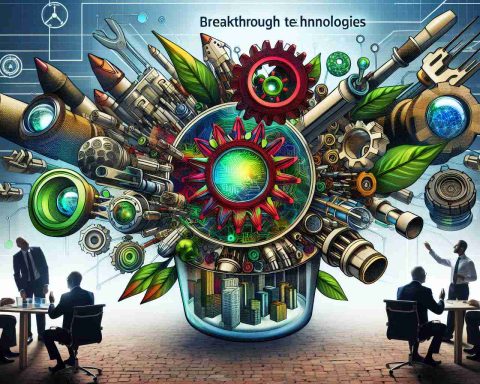Revolutionizing the Power Landscape
The future of energy storage is undergoing a profound transformation, led by cutting-edge advancements in battery technology. As the world strives for sustainability and efficiency, innovative solutions like solid-state and lithium-sulfur batteries are emerging, promising to redefine the way we think about energy production and conservation.
Solid-State Advances: A Leap Towards Efficiency
In the realm of next-generation batteries, solid-state advancements are creating a buzz with their potential to outperform traditional lithium-ion technology. By substituting liquid electrolytes with solid counterparts, these batteries promise not only higher energy density but also lightning-fast charge times. Companies such as Toyota and QuantumScape are at the forefront of this shift, aiming to deliver high-performance, safer batteries that are ideal for electric vehicles and consumer gadgets. This new wave promises a future where overheating concerns become a thing of the past, paving the way for safer energy solutions.
Lithium-Sulfur Innovations: Affordable Power for All
Lithium-sulfur technologies stand on the precipice of revolutionizing cost efficiency in energy storage. With storage potential up to five times that of current lithium-ion options, these batteries could significantly lower costs across sectors like electric vehicles and renewable energy. However, a key to their success lies in addressing their limited lifespan, a challenge researchers eagerly undertake to unlock their full potential for broad adoption.
Rethinking Resources: The Global Impact
These technological leaps suggest an impending surge in lithium demand, prompting nations to reassess supply chains and resource strategies. As we move toward a lithium-powered future, global stakeholders must adapt rapidly to seize emerging opportunities while ensuring ethical and sustainable practices in sourcing and production.
Looking Ahead: Hybrid Power Systems
As these battery innovations progress, the industry may embrace hybrid systems that amalgamate the strengths of various technologies. This hybrid approach promises an era of unmatched energy efficiency, extending sustainable practices across the globe, and heralding a greener tomorrow.
The Future of Energy Storage: Unveiling New Battery Technologies and Trends
The world of energy storage is on the cusp of revolutionary changes, driven by groundbreaking advancements in battery technology. As sustainability and efficiency become global imperatives, emerging innovations such as solid-state and lithium-sulfur batteries are shaping the future of energy production and conservation.
Key Features of Solid-State Batteries: Enhancing Energy Efficiency
Solid-state batteries are making significant headway by replacing traditional liquid electrolytes with solid ones, which offers numerous advantages over established lithium-ion technology. This change promises:
– Higher Energy Density: Solid-state batteries offer greater energy storage in a smaller footprint, making them ideal for compact and portable applications.
– Faster Charging Times: With improved ion conductivity, these batteries can charge quickly, providing a more convenient experience for users.
– Enhanced Safety: Eliminating liquid electrolytes reduces the risk of leaks and combustion, addressing the critical safety concerns associated with overheating.
Leading companies, including Toyota and QuantumScape, are actively developing these batteries to transform the electric vehicle and consumer electronics markets.
The Rise of Lithium-Sulfur Batteries: A Cost-Effective Power Solution
Innovations in lithium-sulfur battery technology present an opportunity to revolutionize the affordability of energy storage, with significant implications for industries such as electric vehicles and renewable energy. Key aspects include:
– Increased Storage Capacity: These batteries can hold up to five times the energy of traditional lithium-ion options.
– Reduced Cost: By potentially lowering production expenses, lithium-sulfur batteries can make sustainable energy more accessible.
Addressing the challenge of their limited lifespan remains critical for their widespread adoption, with ongoing research aimed at unlocking their full potential.
Market Analysis: The Changing Dynamics of Resource Dependency
With these technological advancements on the horizon, an increased demand for lithium is anticipated, compelling global stakeholders to reevaluate supply chains and resource management strategies. Ethical and sustainable sourcing of raw materials will become even more crucial as nations work to sustain these innovations.
Exploring the Hybrid Future of Battery Technology
As solid-state and lithium-sulfur batteries evolve, the industry is likely to explore hybrid systems that combine innate strengths from various technologies. This hybrid approach could lead to:
– Unmatched Energy Efficiency: Leveraging multiple technologies can optimize performance and extend battery life.
– Broader Sustainability Practices: A hybrid solution promotes a comprehensive approach to energy conservation.
These trends herald a new era in energy storage, with the potential to drive global sustainability efforts forward.
For more information on advancements in battery technology and their impact on the energy landscape, visit the Nature.


















